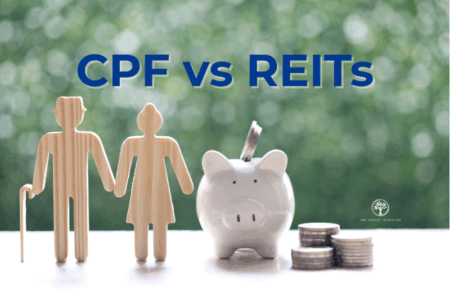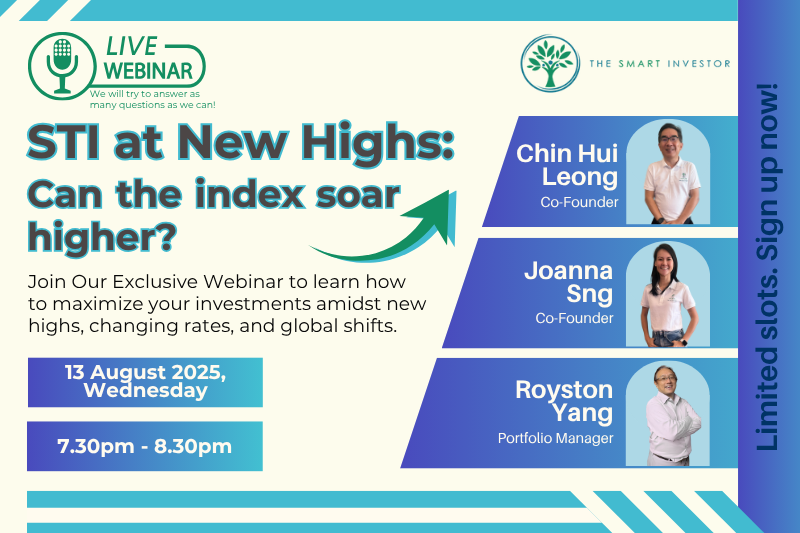You may have noticed this trend recently.
Unit prices for Singapore real estate investment trusts (REITs) have been rising in anticipation of an interest rate cut.
Then, last week, the US Federal Reserve finally delivered its first rate cut in nine months.
To date, shares of industry stalwarts such as CapitaLand Integrated Commercial Trust (SGX: C38U), Keppel REIT (SGX: K71U), and Mapletree Pan Asia Commercial Trust (SGX: N2IU) have churned out total returns of over 20% since the start of the year.
Yet, these gains are a predicament for those who haven’t bought.
They’re stuck.
What if you buy and REIT prices fall right after?
And what if you don’t buy and unit prices keep climbing?
To be fair, these sound like reasonable concerns, don’t they?
But I have bad news: if you’re thinking in these terms, you’re setting yourself up for disappointment.
The Expectation Game
Here’s what people don’t tell you: whether a stock does well or not depends on your expectations.
I’ll level with you — if you bought REITs expecting to be rewarded with quick capital gains from rate cuts, it’s a case of mismatched expectations.
Yes, REITs can appreciate over time.
This scenario occurs when specific REITs are able to raise their distribution per unit (DPU) consistently over the long term.
But that’s not why most investors should own REITs.
The income REITs offer cannot be ignored.
It’s the component that’s more reliable, as REITs must pay out at least 90% of their taxable income to maintain their tax-advantaged status.
Said another way, it’s income you can count on if the REIT performs well.
When Falling Prices Are Good News
Here’s the thing that may surprise you: if you bought REITs for income, you’ll be less disappointed when unit prices fall.
Why is that so?
Simply said — as prices fall, you’ll get to reinvest your distributions at lower prices to generate even more income.
Each dollar of distribution buys more units, which generate more distributions, which buy more units.
That’s not a bad outcome, now is it?
Think about it this way: if you’re collecting distributions for the next 10 or 20 years, wouldn’t you prefer to reinvest them at lower rather than higher prices?
The Reality Check
Let me be clear about one thing: unit prices have risen recently, but that doesn’t mean REITs are suddenly doing better.
There will be a time lag between lower interest rates and REITs being able to refinance their outstanding loans at lower rates.
Some REITs have loans locked in for years.
Others might have hedged their interest rate exposure.
The benefits won’t show up overnight.
At the Smart Dividend Portfolio, we’re turning over each rock, checking how much debt is coming due for each REIT we own.
We want to know which REIT can benefit more from lower rates — not just hope they will.
Get Smart: Focus on What Matters
Let’s not kid ourselves — it’s not the kindness of lower interest rates alone that will carry DPUs higher in the future.
Rate cuts are like a tailwind for cyclists.
They help, but you still need strong legs to pedal up the hill.
Ultimately, it’s the combination of quality assets and capable management teams that will make the most of any interest rate environment.
A REIT with prime properties and capable managers will thrive whether interest rates are 2% or 5%.
A poorly managed REIT with aging properties will struggle regardless.
That’s what we focus on at the Smart Dividend Portfolio — finding REITs with:
- Properties in locations that matter
- Management teams with proven track records
- The ability to grow distributions over time
And that’s just the starting point.
So, if you’re asking “should I buy REITs after the rate cut?”, you’re asking the wrong question.
The right question is: “Am I buying quality REITs for the right reasons?”
If you’re chasing capital gains based on US Fed decisions, you’re playing a guessing game.
If you’re buying solid REITs for growing income over the next decade, temporary price movements become much less important.
So, stop watching the scoreboard. Watch the game.
If you’ve ever asked, “But what do I do with this info?” – read Get Smart, our weekly newsletter. It helps you connect the dots, so you understand what the stories mean for your portfolio. Join thousands of investors who rely on it for steady, grounded investing ideas. Subscribe now and sharpen your insight for free.
Follow us on Facebook, Instagram and Telegram for the latest investing news and analyses!
Disclosure: Chin Hui Leong owns shares of CapitaLand Integrated Commercial Trust and Mapletree Pan-Asia Commercial Trust.






